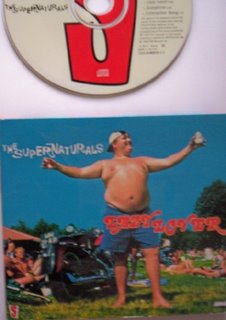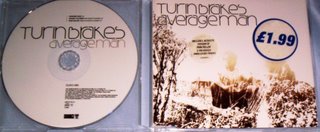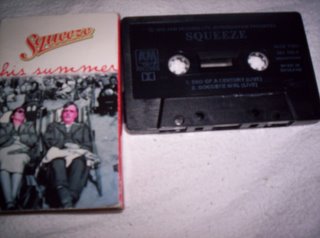
3 Songs EP [Corduroy/Crawl/Make Me Smile (Come Up And See Me)] (RCA PB44029)
Chart debut: 29 Sep 1990
Writers: David Gedge; David Gedge; Steve Harley
Anyone who knows how I chose the title for this blog might not be surprised to see this band crop up. In fact, they seem almost tailor-made for this blog: plenty of Top 40 entries to choose from (19 to date) and yet few if any that are familiar to the casual listener, with the possible exception of 'Kennedy'. More people, it's fair to say, have heard of David Gedge and his ever-changing band of indie romantics than actually heard them.

This also has the honour of being our first EP entry, and as the title implies it contains the three songs listed above (a limited-edition 10" version added a live version of 'Take Me'). It was their second collaboration with Steve Albini, after the re-recorded single of Brassneck issued at the start of the same year - the union was ultimately consummated when Albini recorded the band's most acclaimed album, Seamonsters.
Corduroy was the nominal lead track, and the only song to be used on an album: it was re-recorded for Seamonsters. It finds Gedge in fairly typical lyrical territory, addressing a lover who has spurned him and returned - he coincidentally takes the part of the other man in this situation on their next single 'Dalliance'. The strength here is in the contained anger, noisy but taut guitars and Gedge's deadpan vocal; the effect is as though he's taken a deep breath and decided to say what he has to say to her, rather than just exploding in anger. The chorus contains some intriguing imagery - he wants to show her a photo, but "It's not from that day - I threw all those away." We can probably surmise as much as we need to from that line about what that day was. Like many of the best lyrics, what he doesn't say says as much as what he does.
The original EP recording is for my money the definitive reading of the song - as those familiar with Albini's work will expect, it's a very minimalist arrangement, but the band themselves play their hearts out - in particular, Simon Smith's drums really hit home. He's presumably also responsible for the very loud "CRACK!" sound at 2:43 that I almost regret mentioning here because it won't surprise anyone who reads this. Mind you, if you've got the song on vinyl, you can see it in the groove anyway.
By comparison, the album track (same line-up, same engineer, same studio) seems to lose something, although perhaps it fits the sound of the rest of the LP a little better.
Crawl is for me the real joy of the package, not only because it's the least familiar of the three songs here - although ironically enough it was the track that got the video made for it, issued on the old VHS tape *Punk and usually available at this helpful fansite. It makes something of a break from their other music of this era, opening with a deftly-strummed acoustic guitar, though the tension is soon racked up by the entry of the rhythm section. Gedge's lyrics are still more impressionistic here, to the extent that it's hard to paraphrase at all. I don't know where he is, but I'm glad I'm not there with him - even if "everyone here could be a millionaire" they don't sound like the sort you'd want to be around. It's not at all clear what the vantage point is, or even whether all the lines are coming from the same person but somehow the mystery helps draw the listener in. The last words before the instrumental outro are "'There were some things I had to do'/Say that again and I'll kill you." [my punctuation].
Make Me Smile (Come Up And See Me) is possibly the most familiar track here; it is of course a cover of Cockney Rebel's 1975 Number One, and perhaps at the record company's insistence it was the track chosen for their second Top Of The Pops performance. This might explain why this was one of the few Wedding Present single releases to peak in its second chart week (with thanks to Polyhex). The band thrash their way through the song effectively, and the electrified recasting of Jim Creegan's Spanish guitar solo is entertaining enough, but this isn't the best of their many cover versions. And does it really make sense for Gedge to complain that somebody's "Brought the Rebel to the floor"?
Seamonsters appeared in 1991 to critical acclaim and became the band's only Top 20 studio album. Founding guitarist Pete Solowka left soon afterwards, and 1992 saw the band make history with their twelve consecutive hit singles in as many months. After that, however, the band seemed to slip off the radar, with two and a half further albums selling mostly to fans before a temporary split in January 1997. Gedge revived the name in 2004, in time for one last Peel session, and released the excellent but largely overlooked Take Fountain album in 2005.
Official website: www.scopitones.co.uk
YouTube if you want to: Crawl video.
Where to get it: The digitially remastered version of Seamonsters includes all the studio tracks from the EP, so you can decide for yourself which 'Corduroy' is better. The new Ye Ye: Best Of The RCA Years collection has 'Make Me Smile'. Sadly the live 'Take Me' appears only on the deleted US compilation Singles 1989-1991, available only from Scopitones at time of writing.


